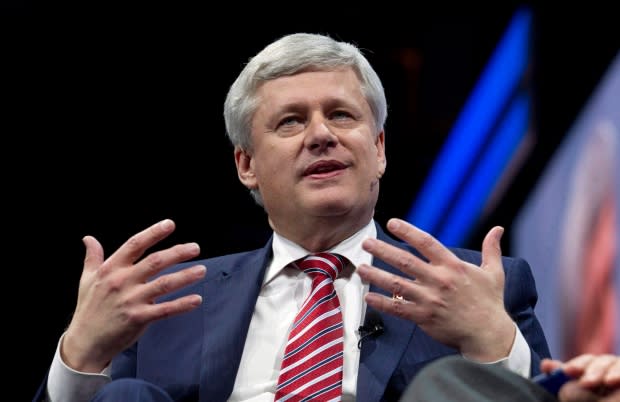We're adopting U.S. abortion anxieties as our own. They don't fit: Robyn Urback
Stephen Harper must have found the greatest hiding spot in the world for his secret agenda. So great, in fact, that he forgot where it was.
Canada's near-decade under Prime Minister Harper did not bring about new abortion laws or a repeal of gay marriage — despite a free vote in 2006 over a motion to restore the "traditional" definition of marriage (which, granted, would not have changed the law, even if it passed) and a handful of private member's bills that, in one way or another, aimed to reopen the abortion debate.
To social conservatives, Harper was a dud and a disappointment.
In 2012, he voted against his own MP's motion to study when a life begins. (We're still waiting for parliamentarians to strike up a committee to figure out what happens after we die, or why bad things happen to good people, and other such work apparently reserved for the House of Commons.) And he eventually resorted to simply blocking motions from making it to the floor.
The only nugget Harper offered to his social conservative base — and certain elements of his caucus — was to exclude abortion from Canada's global maternal health initiative. But at home, he not only left abortion alone, he went great lengths to avoid it.

Years later, Harper's critics still paint him as a ruthless ideologue. But he was a pragmatist more than anything: reopening the abortion debate simply wasn't politically prudent. Harper would betray his own promises about caucus freedoms to stymie the conversation.
The agenda currently underway in the United States, however, is hardly imaginary: With the balance of the U.S. Supreme Court now tilted to the right, Republican-controlled states, one after another, have drafted unconstitutional-by-design laws that essentially ban the procedure outright.
The aim is to kick the cases up the legal ladder to the top court, with the ultimate goal of overturning Roe vs. Wade.
These anxieties have, of course, leached into Canada, rousing concerns about what might happen if the Conservatives again form government after the fall election.
There is some merit to those concerns: Conservative Leader Andrew Scheer is lauded by the anti-abortion movement for his voting record and expressed support, and many of his MPs attended an anti-abortion rally in Ottawa a few weeks ago.
Scheer promised years ago that he would allow free votes on matters of conscience (though he dodges when asked now if he stands by that promise), while at the same time repeatedly stating that he will not reopen the abortion debate.
Scheer certainly wouldn't be the first politician to say one thing during a campaign and do another once elected. But from a political perspective, an about-face on his abortion promise would be terribly unwise — as Harper quickly recognized.

Canada is not the United States. Geography compels us to compare ourselves to our southern neighbour, but we actually have far more in common with Scandinavian and Western European countries when it comes to social policy and attitudes on issues such as health care, maternity leave, human rights laws and abortion access. An 18-month maternity leave is as foreign to Americans as a "heartbeat" bill is to us.
When we adopt U.S. anxieties as our own, we are importing from a country that is actually out of step with much of the developed world. To take their struggle over abortion and apply it to Canada is to attempt to cram it into a context that doesn't really fit.
This is not to say that Canada does not have an active, well-funded and politically driven anti-abortion movement. It does. Or that the fight for safe and legal abortion in Canada wasn't hard-fought, complicated and violent. It was. Or that the struggle for abortion access in Canada is over. It isn't.
There are still enormous discrepancies in access depending on where you live and how much money you have, particularly for women in rural areas who need to travel for the procedure.
But as a political wedge issue, abortion in Canada doesn't really provide.
All three major party leaders share the same pledge that they will not reopen the debate; the only wiggle room is in whether leaders will force their caucuses to toe the party line.
This is in stark contrast to the United States, where abortion has always been on the Republican front burner — from Roe vs. Wade, to Planned Parenthood vs. Casey, to now.
Canada also lacks the highly politicized Supreme Court that is central to the U.S. abortion debate, and the grossly loose election-financing laws that allow religious mega-donors to wield political influence.
Canada is probably at least a generation ahead of the U.S. on social issues, including gay marriage, transgender rights, assisted death, legalization of marijuana and abortion. And generally speaking, when these issues come before the courts, we typically don't move backward.
As an example, earlier this month, Ontario's top court upheld a divisional court decision holding that physicians must write referrals for procedures that clash with their moral beliefs, including assisted death and abortion.
It is unlikely — though certainly not impossible — that Canada would see such stringent restrictions on abortion access that individual states have imposed on American women over the last several decades. The last Conservative prime minister had nearly a decade to implement some sort of abortion law. But he read the room and declined.
This doesn't mean that we should be complacent; simply that we should carefully reflect on the realities of our country's individual climate. "Be afraid" is an enormously effective campaign slogan, but only if we sit back and let it be.
This column is part of CBC's Opinion section. For more information about this section, please read our FAQ.

